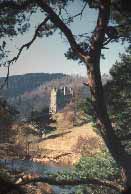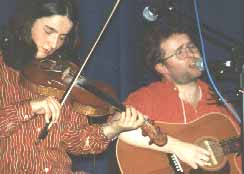FolkWorld article by Michael Moll:
The Scottish borders and its own sense of identity
John Morran on Border traditions, Scots identity and Deaf Shepherds
 "When we talk about the Borders of Scotland, we mean the Eastern part of the Borders. There is another Border area near Dumfries and Galloway, south-west, but when you talk of the borders you mean the Middle-East. It's a beautiful place. And that region was a big area of battles between England and Scotland in the past. What would happen would be that the English would come up and they would rabid the whole of the Borders, set fire and burn the castles and raid the villages and stuff. And then the Scots would have taken out back through the Borders and they would burn the whole place, raid the villages and all that sort of things."
"When we talk about the Borders of Scotland, we mean the Eastern part of the Borders. There is another Border area near Dumfries and Galloway, south-west, but when you talk of the borders you mean the Middle-East. It's a beautiful place. And that region was a big area of battles between England and Scotland in the past. What would happen would be that the English would come up and they would rabid the whole of the Borders, set fire and burn the castles and raid the villages and stuff. And then the Scots would have taken out back through the Borders and they would burn the whole place, raid the villages and all that sort of things."
John Morran, the excellent singer of Scotland's liveliest and most powerful traditional bands Deaf Shepherd, is an expert in the history and traditions of Scotland and the Lowlands in particular. Born in the mining village Muirkirk in Ayrshire and being proud of speaking in a broad Lowland Scots dialect, John brings the history of this region back into today's life. In Deaf Shepherd, he brings in the gentle and beautiful side of the Scottish traditions, with mainly quiet and wonderful songs in Scots.
 But back to the Borders and its inhabitants, who have, with this history, developed a sense of identity of their own. "They are very much Borderers, so first they are Borderers, Scottish Borderers, and then they are Scottish, and last probably very least they would be British - although there are a lot of people in the Borders who would consider themselves also British." John thinks this is also the reason giving that unique character, a unique sense of belonging to that part of the country.
But back to the Borders and its inhabitants, who have, with this history, developed a sense of identity of their own. "They are very much Borderers, so first they are Borderers, Scottish Borderers, and then they are Scottish, and last probably very least they would be British - although there are a lot of people in the Borders who would consider themselves also British." John thinks this is also the reason giving that unique character, a unique sense of belonging to that part of the country.
Speaking of the music traditions of the Borders, first to name are the many Border ballads. "The Music isn't quite so strong, but there is a tradition of fiddle music in the borders - it's not very strong, certainly not like Shetland. And there are the Lowland and Border Pipes, being small pipes."
John explains that each town of the Borders basically has its own history really; as the Borders are a very historical place. "Each town and village has its own annual fete that is called the Common Riding. What used to happen in the past was that people would raid out the commons, the common land, and they would check the boundary of the town that it hadn't been infringed by any English raiders or something like that. And they still do that as ceremonial thing, they do that every summer. And there are lots and lots of songs that go with it, a lot of them are rubbish, absolutely rubbish, but a lot of the songs are really really good. Hawick is a place that has a huge tradition in history, among all the towns in the borders, Hawick is the town where the common riding is mass, it's a very historical place, full of history, very strange place in times as well."
 To come back to identity, what does John think about the Scots identity at the moment? " The Scots identity has always been very strong, we have always considered ourselves as a nation; I think you could speak to most people in Scotland and if you asked their nationality they wouldn't say British, they would say Scottish. So our national identity is very important."
To come back to identity, what does John think about the Scots identity at the moment? " The Scots identity has always been very strong, we have always considered ourselves as a nation; I think you could speak to most people in Scotland and if you asked their nationality they wouldn't say British, they would say Scottish. So our national identity is very important."
However, John stresses that there are two cultures in Scotland really, the Highland culture on the one hand, and the Lowland culture on the other. In Deaf Shepherd, both cultures meet and blend together – the family of Rory Campbell the piper and his sister, fiddler Marie-Anne Curran comes from the highlands while John comes from the Lowlands. "The Lowland part of Scotland wasn't very nice to the Highland part of Scotland for a long time, because the Lowland part of Scotland considered the Highlanders a bit like a – an ‚Untermensch' it is, isn't it? Maybe not quite as bad as that, but certainly not very nice. And a lot of Scottish lairds, who owned land in Scotland, they also owned land in England, so they were always trying to get up the back sides of the English so that they wouldn't have any problems. So in Scotland for a long while that difference has kept us not a free country, and we had problems, but still we considered ourselves Scottish. And it's more so in the last 30 or 40 years, because the young people of Scotland have started taking an interest in their music again, and in their literature. Because our culture was deprived to a large extent of Gaelic, you weren't allowed really to speak Gaelic except in the Outer Hebrides; Lowland Scots, my language, was considered as just a form of English, which it never was, it was never a form of English. And what has happened is that since the Act of Union, over the last 300 years, our language has gradually, slowly but surely, become more anglicised and started dying out. But we are all getting back into our culture again, it's very important for us being Scottish.”
For Deaf Shepherd, it is the love to their Scottish traditions and their music that makes them playing the way they do.
And I think Deaf Shepherd have found their very own way of expressing the traditions, it's not just any other Scottish band – they are very traditional, but they bring that bit of a buzz into the music that is by far not usual. They are one of the most exciting traditional bands that has come out of Scotland for a long time. Their trad music has a kind of modern feeling in it that comes just out of the buzz and the fun of playing. Catch them in live and you know what I mean.
Photos (from top to bottom): Neidpath Castle near Peebles in the Borders; John Morran and Claire McLaughlin; Rory Campbell and Deaf Shepherd
Photo Credit: The Mollis
There is another interview with Deaf Shepherd (that has been published in Folksblatt magazine 2 years ago) in the German version of this issue!
Latest published CD: Synergy, on Greentrax Recordings
Contact: Deaf Shepherd Homepage e-mail the Deafis' Marianne.
Back to the content of FolkWorld Articles & live reviews
To the content of FolkWorld online magazine Nr. 6
© The Mollis - Editors of FolkWorld; Published 10/98
All material published in FolkWorld is © The Author via FolkWorld. Storage for private use is allowed and welcome. Reviews and extracts of up to 200 words may be freely quoted and reproduced, if source and author are acknowledged. For any other reproduction please ask the Editors for permission.
FolkWorld - Home of European Music

Layout & Idea of FolkWorld © The Mollis - Editors of FolkWorld
 "When we talk about the Borders of Scotland, we mean the Eastern part of the Borders. There is another Border area near Dumfries and Galloway, south-west, but when you talk of the borders you mean the Middle-East. It's a beautiful place. And that region was a big area of battles between England and Scotland in the past. What would happen would be that the English would come up and they would rabid the whole of the Borders, set fire and burn the castles and raid the villages and stuff. And then the Scots would have taken out back through the Borders and they would burn the whole place, raid the villages and all that sort of things."
"When we talk about the Borders of Scotland, we mean the Eastern part of the Borders. There is another Border area near Dumfries and Galloway, south-west, but when you talk of the borders you mean the Middle-East. It's a beautiful place. And that region was a big area of battles between England and Scotland in the past. What would happen would be that the English would come up and they would rabid the whole of the Borders, set fire and burn the castles and raid the villages and stuff. And then the Scots would have taken out back through the Borders and they would burn the whole place, raid the villages and all that sort of things."
 But back to the Borders and its inhabitants, who have, with this history, developed a sense of identity of their own. "They are very much Borderers, so first they are Borderers, Scottish Borderers, and then they are Scottish, and last probably very least they would be British - although there are a lot of people in the Borders who would consider themselves also British." John thinks this is also the reason giving that unique character, a unique sense of belonging to that part of the country.
But back to the Borders and its inhabitants, who have, with this history, developed a sense of identity of their own. "They are very much Borderers, so first they are Borderers, Scottish Borderers, and then they are Scottish, and last probably very least they would be British - although there are a lot of people in the Borders who would consider themselves also British." John thinks this is also the reason giving that unique character, a unique sense of belonging to that part of the country.
 To come back to identity, what does John think about the Scots identity at the moment? " The Scots identity has always been very strong, we have always considered ourselves as a nation; I think you could speak to most people in Scotland and if you asked their nationality they wouldn't say British, they would say Scottish. So our national identity is very important."
To come back to identity, what does John think about the Scots identity at the moment? " The Scots identity has always been very strong, we have always considered ourselves as a nation; I think you could speak to most people in Scotland and if you asked their nationality they wouldn't say British, they would say Scottish. So our national identity is very important."
